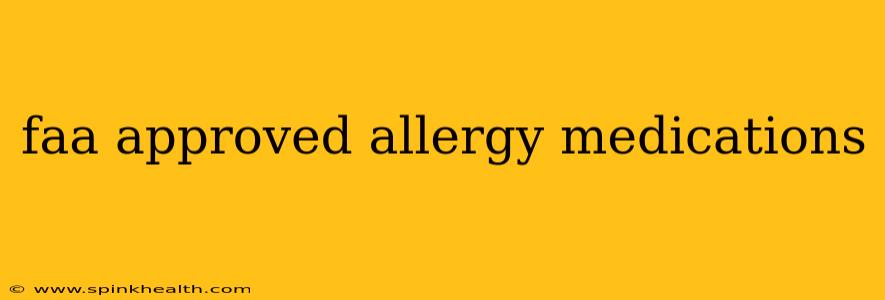Ah, the dreaded sniffles, itchy eyes, and relentless sneezing. For many, allergy season is a constant battle, but for pilots and frequent flyers, the stakes are higher. Taking medication that could impair judgment or alertness is simply not an option when safety is paramount. So, what are the FAA-approved allergy medications that allow you to manage your symptoms without compromising your ability to fly? Let's delve into the world of air travel and allergy relief.
This isn't a simple yes or no answer. The Federal Aviation Administration (FAA) doesn't provide a specific list of "approved" allergy medications. Instead, they focus on the effects of medications on a pilot's ability to perform safely. The key is to understand how different allergy medications affect your cognitive function, alertness, and overall physical well-being. Choosing the right medication, and understanding its impact on you, is crucial for safe flight.
What are the key considerations for pilots and frequent flyers regarding allergy medication?
The primary concern for pilots and frequent flyers isn't whether a medication is explicitly "approved," but whether it meets the FAA's standards for airworthiness. This means considering potential side effects such as:
- Drowsiness: Many allergy medications, especially older antihistamines, can cause drowsiness, significantly impacting reaction time and judgment—clearly unsuitable for flying.
- Blurred vision: Another potential side effect that would compromise safety.
- Cognitive impairment: This includes reduced alertness, difficulty concentrating, or impaired decision-making.
- Adverse reactions: Unexpected or severe side effects can arise from any medication, making it crucial to understand your body's response and have a plan in place if needed.
What types of allergy medications are generally considered safer for flying?
While there's no official "approved" list, certain medications are generally considered safer than others due to their lower risk of causing the side effects listed above. These often include:
-
Second-generation antihistamines (non-drowsy): These are often preferred because they are less likely to cause drowsiness than their older counterparts. Examples include cetirizine (Zyrtec), fexofenadine (Allegra), and loratadine (Claritin). However, even these medications can have different effects on different individuals, so pay close attention to how you personally respond.
-
Intranasal corticosteroids: These nasal sprays, like fluticasone (Flonase) or mometasone (Nasonex), work directly in the nasal passages to reduce inflammation and are less likely to cause systemic side effects.
-
Eyedrops: For allergy-related eye symptoms, antihistamine or mast cell stabilizer eyedrops can provide relief without significant drowsiness.
Are there specific allergy medications I should avoid before flying?
Yes, certain allergy medications should generally be avoided before flying due to their higher risk of causing drowsiness or other side effects that could impair your ability to fly safely:
-
First-generation antihistamines (drowsy): These include medications like diphenhydramine (Benadryl) and chlorpheniramine (Chlor-Trimeton). These are known to cause significant drowsiness and should be avoided before and during flying.
-
Decongestants (oral or nasal): While sometimes helpful for nasal congestion, oral decongestants can increase blood pressure and cause nervousness, potentially affecting flight performance. Nasal decongestants can also cause rebound congestion, making symptoms worse in the long run.
-
Combination medications: Many over-the-counter allergy medications combine antihistamines with decongestants. These should generally be avoided due to the potential for combined side effects.
How can I determine which allergy medication is right for me before flying?
The best approach is to:
-
Consult your doctor: Discuss your allergy symptoms and your need to fly safely. Your doctor can help determine the best course of action and recommend suitable medications, considering your individual health history.
-
Start medication well in advance: Don't wait until the day of your flight to start taking medication. Allow time to assess how your body responds to the medication and adjust the dosage if needed under your doctor's guidance.
-
Test the medication: Before a crucial flight, try the medication on a non-flying day to see how it affects you. Pay close attention to any drowsiness, changes in vision, or cognitive impairment.
-
Follow instructions meticulously: Always follow the recommended dosage and instructions on the medication label or as prescribed by your doctor.
-
Keep a record: Note the medication you took, the dosage, and your reaction to help you and your doctor track your allergy management.
Can I take over-the-counter allergy medications before flying?
Yes, but always exercise caution and prioritize your safety. Carefully review the medication's label for potential side effects, especially drowsiness. Prioritize non-drowsy options, like those mentioned earlier, and always consult your doctor if you have any concerns.
This information is for educational purposes only and should not be considered medical advice. Always consult with a healthcare professional to determine the best course of treatment for your specific allergy symptoms and individual needs, especially if you are a pilot or frequently fly. Your safety is paramount, both in the air and on the ground.

